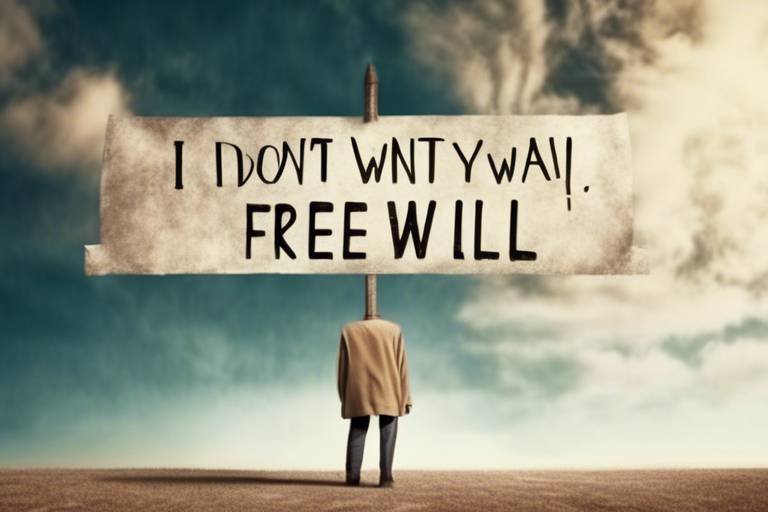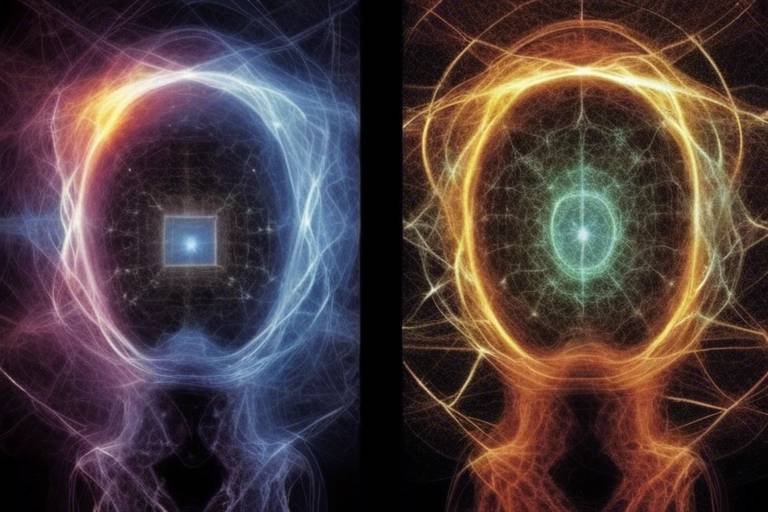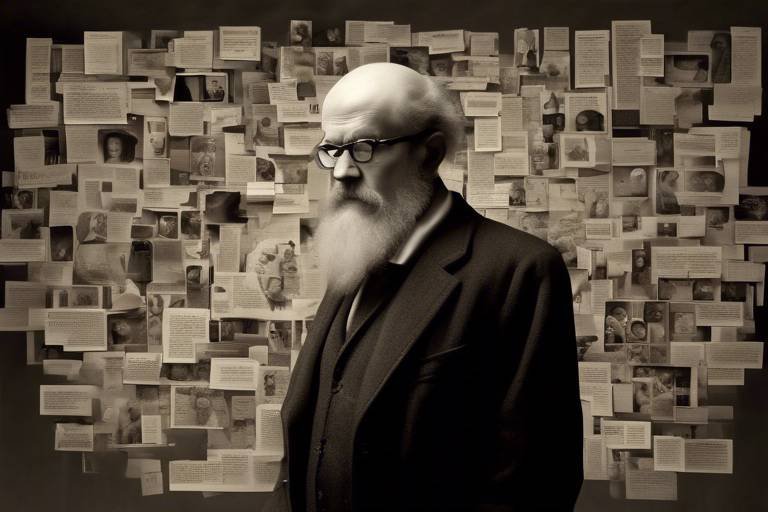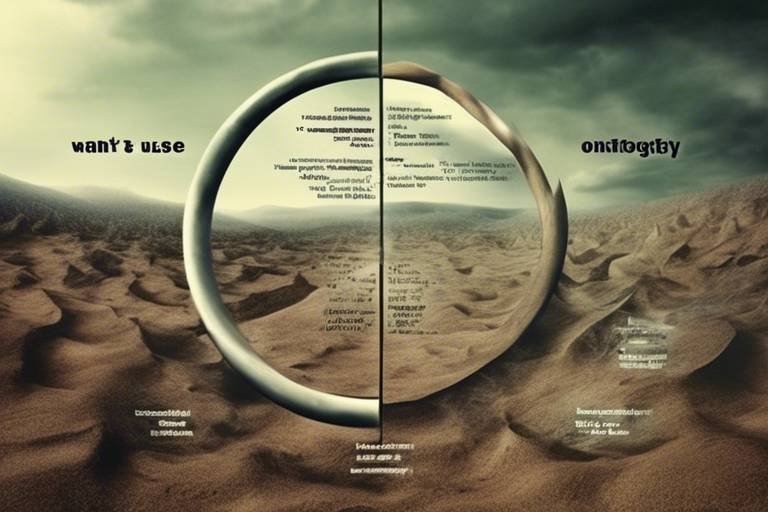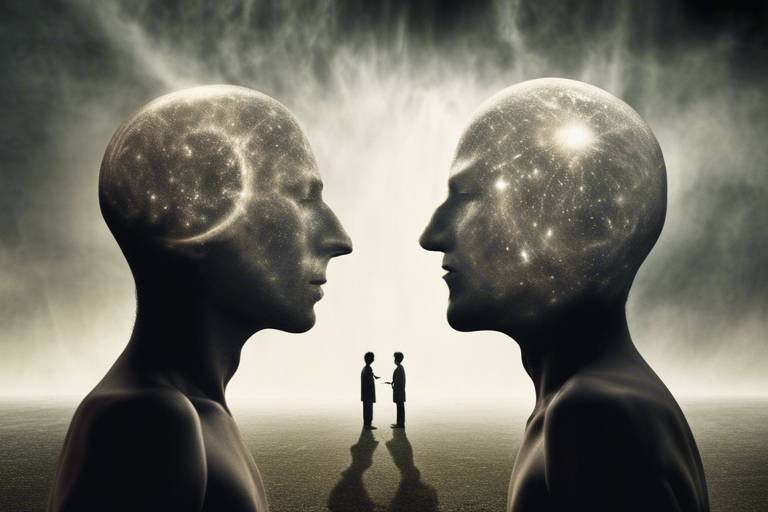Metaphysics' Take on the Concept of Free Will
Have you ever pondered whether you truly control your choices or if they are merely the result of prior events? The concept of free will has intrigued thinkers for centuries, and its implications stretch far beyond philosophical discussions. In metaphysics, free will is not just a simple matter of making choices; it intertwines with our understanding of existence, reality, and the nature of the universe itself. This article will explore the philosophical implications of free will through a metaphysical lens, examining various theories, arguments, and perspectives that shape our understanding of autonomy and determinism in human action.
At its core, free will is often defined as the ability to make choices unconstrained by external factors. Imagine standing at a crossroads, where each path represents a different decision. The essence of free will lies in the belief that you can choose any path without being forced down one by fate or prior circumstances. This notion is significant because it underpins our sense of identity and moral responsibility. Without free will, how can we hold individuals accountable for their actions? This question leads us to consider how free will contrasts with determinism, a philosophical stance suggesting that every event, including human actions, is determined by preceding events and natural laws. Thus, understanding free will requires a deep dive into its characteristics and the philosophical waters that surround it.
The tension between determinism and free will is like a tug-of-war, with each side pulling for dominance in our understanding of human behavior. Determinism posits that every action we take is a result of a chain of prior causes. If this is true, can we genuinely claim to have free will? This philosophical conundrum raises questions about moral responsibility. If our actions are predetermined, can we be held accountable for them? The implications are profound, affecting not only philosophical thought but also how we perceive agency in our lives.
To navigate the complexities of this debate, it’s essential to explore the various types of determinism:
- Causal Determinism: This form suggests that every event or action is the result of preceding events in accordance with the laws of nature.
- Logical Determinism: This perspective argues that propositions about the future are either true or false, implying that future events are already determined.
- Psychological Determinism: This view emphasizes that our decisions are influenced by our desires, beliefs, and past experiences, suggesting that our choices are not entirely free.
Each type of determinism adds a layer of complexity to the debate about free will, influencing how we think about human decision-making.
Hard determinism takes a firm stance, arguing that free will is merely an illusion. According to this view, every action we take is predetermined by prior causes, leaving no room for autonomy. This perspective challenges the very notion of moral responsibility. If our actions are preordained, how can we justly punish or reward individuals for their choices? It’s a daunting thought that forces us to reconsider the foundations of ethics and accountability.
On the flip side, soft determinism, or compatibilism, suggests that free will and determinism can coexist. This perspective argues that while our choices may be influenced by prior events, we can still act freely within those constraints. It’s like being in a game where the rules are set, but you still have the freedom to choose your strategy. This view opens the door to understanding how choices can be considered free even if they are shaped by previous circumstances. It’s a nuanced take that attempts to bridge the gap between two seemingly opposing ideas.
As we delve deeper into the philosophical perspectives on free will, we encounter a rich tapestry of thought. Libertarianism asserts that we possess genuine free will, arguing that individuals can make choices independent of determinism. In contrast, compatibilism offers a middle ground, suggesting that free will is compatible with determinism. Then there’s skepticism, which questions whether free will truly exists at all. Each of these perspectives contributes to the ongoing debate in metaphysics, challenging us to rethink our assumptions about autonomy and choice.
The connection between free will and moral accountability is profound. If we accept that free will exists, we must also grapple with the implications for ethics and responsibility in human behavior. For instance, how do we determine culpability in a legal context if someone's actions are influenced by factors beyond their control? This question is crucial, as it shapes our legal systems and societal norms.
In the realm of law, the concept of free will plays a pivotal role in determining culpability. Legal systems often hinge on the assumption that individuals possess the capacity to make choices. This belief influences how we approach issues of punishment and rehabilitation. If we view a person as having acted freely, we may be more inclined to hold them accountable for their actions. Conversely, if we accept a deterministic view, we might advocate for a more compassionate approach, focusing on the underlying causes of behavior rather than assigning blame.
Moreover, psychological research sheds light on how cognitive processes affect our perception of free will. Studies have shown that our decisions can be influenced by subconscious factors, challenging the idea that we are fully aware of our choices. This raises the question: if our decisions are shaped by cognitive biases and external stimuli, to what extent can we claim to act freely? Understanding these psychological insights is crucial in navigating the complex terrain of free will and human agency.
- What is free will? Free will is the ability to make choices that are not determined by prior causes or external factors.
- What is determinism? Determinism is the philosophical belief that every event, including human actions, is determined by preceding events and natural laws.
- Can free will and determinism coexist? Yes, soft determinism (or compatibilism) suggests that free will can exist within a deterministic framework.
- How does free will relate to moral responsibility? If individuals possess free will, they can be held accountable for their actions; if not, moral responsibility may be questioned.

The Nature of Free Will
When we talk about free will, we're diving into a deep and often murky pool of philosophical inquiry. At its core, free will is the ability to make choices that are not predetermined by prior causes or divine intervention. Imagine standing at a fork in the road, with each path representing a different choice. The very essence of free will is the belief that you can choose either path, and that your decision is not simply a product of the circumstances surrounding you or a series of events that have already taken place.
Free will is significant because it underpins our understanding of personal autonomy and moral responsibility. If we are genuinely free to make our own choices, then we can be held accountable for those choices. This notion of accountability is crucial in various aspects of life, including ethics, law, and personal relationships. However, the concept of free will is often contrasted with determinism, which posits that every event, including human actions, is the result of preceding events in accordance with the laws of nature. This tension raises profound questions: Are we truly the architects of our fate, or are our choices merely the end products of an intricate web of causal relationships?
To better understand the nature of free will, we must consider its defining characteristics:
- Autonomy: The ability to make choices independently.
- Intentionality: The capacity to act with purpose and direction.
- Regret and Responsibility: The emotional responses that arise from our choices, which presuppose the ability to choose differently.
These characteristics highlight that free will is not merely a philosophical abstraction; it has real-world implications. For instance, when you make a decision about your career, relationships, or even daily choices like what to eat for breakfast, the belief in your free will empowers you to take charge of your life. It’s like being the captain of a ship navigating through a storm; you have the tools and the ability to steer your vessel in the direction you choose, despite the turbulent waters around you.
However, the debate surrounding free will is far from settled. Some argue that our choices are influenced by a myriad of factors, including genetics, upbringing, and social environment. This perspective suggests that while we may feel we are making free choices, those choices are heavily influenced by forces beyond our control. It's akin to being a puppet on strings, where the strings represent the various influences in our lives. So, the question remains: How much control do we truly have over our decisions?
In conclusion, the nature of free will is complex and multifaceted. It challenges us to consider not only how we make choices but also the implications of those choices on our lives and society as a whole. As we delve deeper into the philosophical waters of free will, we uncover layers of meaning that can either empower us or leave us questioning the very fabric of our autonomy.

Determinism vs. Free Will
When we dive into the philosophical waters of determinism and free will, we find ourselves in a fascinating tug-of-war between two powerful concepts that shape our understanding of human behavior. Imagine standing at a crossroads where every choice you make is influenced by a multitude of factors, yet you feel a sense of autonomy in your decisions. This paradox lies at the heart of the debate. On one side, we have determinism, which asserts that every event, including human actions, is determined by preceding events and natural laws. On the other, free will suggests that individuals have the capacity to choose differently, independent of past influences.
The tension between these two perspectives raises profound questions: Are we mere puppets in a cosmic play, controlled by the strings of fate? Or are we the authors of our own stories, capable of making choices that shape our destinies? To navigate this complex landscape, it's essential to explore the implications of each viewpoint, particularly regarding moral responsibility and human agency.
Determinism challenges the notion of free will by suggesting that our choices are merely the result of prior causes, much like a chain reaction. For instance, if you choose to eat an apple instead of a donut, determinists might argue that this decision was influenced by your upbringing, your health goals, and even the availability of the apple at that moment. In this view, the choice appears less like a spontaneous act of will and more like the inevitable outcome of a series of events.
Conversely, proponents of free will argue that despite these influences, individuals still possess the ability to make choices. They might assert that the feeling of making a choice is real and significant, even if it is influenced by external factors. This belief in agency is not just philosophical; it has real-world implications. For example, if we believe in free will, we are more likely to hold individuals accountable for their actions, believing they had the power to choose differently.
To better understand the nuances of this debate, let's take a look at the various types of determinism:
| Type of Determinism | Description |
|---|---|
| Causal Determinism | Every event or action is the result of preceding events in accordance with the laws of nature. |
| Logical Determinism | The future is already determined as true or false, making it impossible for events to happen otherwise. |
| Psychological Determinism | Human behavior is determined by psychological factors, such as desires, beliefs, and past experiences. |
Each of these types of determinism presents its own challenges to the concept of free will. For instance, if our actions are solely dictated by past experiences and psychological states, can we genuinely say we are free? Or are we simply acting out a script written by our history?
Ultimately, the clash between determinism and free will invites us to reflect on our understanding of human nature. It compels us to ask ourselves: Are we the captains of our ships, or are we merely drifting on the currents of fate? While the debate may never reach a definitive conclusion, it continues to inspire deep philosophical inquiry and personal reflection about the nature of our choices and the essence of what it means to be human.
- What is the main difference between determinism and free will? Determinism suggests that every action is predetermined by prior causes, while free will posits that individuals can make independent choices.
- Can free will exist in a deterministic universe? Yes, some philosophers argue for compatibilism, suggesting that free will and determinism can coexist.
- How does this debate affect moral responsibility? If determinism is true, it raises questions about accountability, as actions may not be entirely within an individual's control.

Types of Determinism
When we dive into the concept of determinism, it's essential to recognize that it's not a one-size-fits-all notion. In fact, there are several types of determinism, each offering a unique perspective on how our actions and choices are influenced by prior events. Understanding these distinctions can illuminate the ongoing debate surrounding free will and human agency. Let's break down some of the most prominent types of determinism.
First up is causal determinism, which suggests that every event or action is the result of preceding events in accordance with the laws of nature. Think of it like a row of dominoes; when one falls, it sets off a chain reaction that leads to the others falling in a predictable manner. This perspective posits that if we knew all the initial conditions and the laws governing them, we could predict every future event, including human decisions. This raises a challenging question: if our choices are merely the result of prior causes, do we truly have the ability to choose freely?
Next, we have logical determinism, which is a bit more abstract. This type argues that propositions about the future are either true or false, regardless of our ability to influence them. For instance, if it's true that "Tomorrow it will rain," then it will rain, irrespective of any actions we might take to prevent it. This perspective leads to a rather unsettling conclusion: if the future is already determined, what role do we play in our lives? Are we simply actors in a predetermined script?
Another significant form of determinism is psychological determinism. This viewpoint emphasizes that our decisions and actions are driven by our psychological states, such as desires, beliefs, and motivations. Imagine a puppet on strings; while the puppet appears to move freely, its actions are controlled by the puppeteer. Similarly, our choices may seem autonomous, but they can be heavily influenced by our past experiences and mental states. This leads us to ponder: to what extent are we truly in control of our actions if they are shaped by our psychological makeup?
To summarize, here’s a quick table that outlines the different types of determinism:
| Type of Determinism | Description |
|---|---|
| Causal Determinism | Every event is the result of preceding events in accordance with natural laws. |
| Logical Determinism | Propositions about the future are true or false, regardless of human influence. |
| Psychological Determinism | Our decisions are influenced by our psychological states and past experiences. |
Each of these types of determinism presents a unique challenge to our understanding of free will. They force us to confront some difficult questions about the nature of human agency and responsibility. Are we simply products of our environment, past experiences, and natural laws? Or is there a space for genuine choice and autonomy in our lives? These are the questions that keep philosophers awake at night, and they are at the heart of the free will debate.

Hard Determinism
Hard determinism presents a compelling yet challenging perspective on the nature of free will. According to this view, every action we take is a direct result of preceding events and conditions, leaving no room for genuine autonomy. Imagine a grand, intricate clockwork mechanism where every gear, no matter how small, plays a crucial role in dictating the movement of the hands. In this metaphor, our choices are merely the ticking of the clock, predetermined by the arrangement of gears that represent our past experiences, genetic makeup, and environmental influences.
At the heart of hard determinism lies the assertion that free will is an illusion. Proponents argue that if every event is caused by prior events, then our sense of making choices is simply a byproduct of our brain's complex processes. This perspective raises significant questions about moral responsibility. If our actions are predetermined, can we truly hold individuals accountable for their decisions? This dilemma creates a ripple effect across various domains, including ethics, law, and personal relationships. For instance, consider the implications for a criminal who commits an act of violence; if their actions were predetermined by a series of past events, can we justly punish them, or are they, in a sense, victims of their own circumstances?
To further illustrate this viewpoint, let’s break down some core arguments that hard determinists often present:
- Causal Chain: Every event, including human actions, is part of a causal chain that can be traced back through time. This means that our choices are influenced by a multitude of factors beyond our control.
- Scientific Support: Many hard determinists point to findings in neuroscience that suggest our brain makes decisions before we are consciously aware of them. This raises the question: if our brain decides for us, where does free will fit in?
- Predictability: If we had complete knowledge of all variables influencing a person's life, we could predict their actions with a high degree of accuracy. This suggests that free will is an illusion, as our decisions can be foreseen based on prior causes.
However, the hard determinism stance is not without its critics. Many philosophers argue that the concept of moral responsibility is essential for a functioning society. They contend that even if our actions are influenced by prior events, the ability to reflect on those actions and learn from them still grants us a degree of agency. This ongoing debate illustrates the tension between hard determinism and the more nuanced views that allow for some form of free will.
In conclusion, hard determinism challenges our understanding of human agency and moral responsibility. It poses profound questions about the nature of our choices and the extent to which we can be held accountable for our actions. As we navigate the complexities of free will and determinism, it becomes clear that this philosophical inquiry is not just an academic exercise but a crucial exploration of what it means to be human.
- What is hard determinism? Hard determinism is the philosophical view that all events, including human actions, are determined by preceding events and conditions, negating the possibility of free will.
- How does hard determinism affect moral responsibility? It raises significant questions about accountability, suggesting that if our actions are predetermined, it may be unjust to punish individuals for their choices.
- Are there any alternatives to hard determinism? Yes, alternatives include soft determinism (compatibilism), which argues that free will and determinism can coexist, and libertarianism, which posits that individuals have genuine free will.

Soft Determinism
Soft determinism, often referred to as compatibilism, presents a fascinating perspective on the age-old debate between free will and determinism. It suggests that free will and determinism are not mutually exclusive but can coexist harmoniously. Imagine a river flowing within its banks; while the water's path may be determined by the riverbed, the water itself can still choose to swirl and eddy in various directions. In this analogy, the river represents determinism, while the water symbolizes the choices we make within that framework.
At the heart of soft determinism is the idea that our choices, although influenced by prior causes and conditions, can still be considered free as long as they stem from our own desires and motivations. This perspective challenges the notion that every action is merely a reaction to external forces, asserting instead that individuals can act according to their own will, even if that will is shaped by their experiences and environment. For instance, when someone decides to pursue a career based on their interests, they are exercising their free will, even if those interests were cultivated by past experiences.
Soft determinists argue that the essence of free will lies in the ability to make choices that align with one's internal states, such as beliefs, desires, and intentions. This view emphasizes personal responsibility, suggesting that individuals can be held accountable for their actions, as those actions are reflective of their true selves. However, it also acknowledges that these choices are influenced by a multitude of factors, including biology, upbringing, and societal norms.
To further illustrate this concept, consider the following points:
- Internal vs. External Influences: While external factors shape our decisions, the internal motivations that drive our choices are what make them free.
- Responsibility: Soft determinism supports the idea that we can be morally responsible for our actions, as long as we are acting in accordance with our desires.
- Real-World Applications: This perspective has significant implications in various fields, including psychology, ethics, and law, where understanding human behavior is crucial.
In essence, soft determinism provides a middle ground in the debate over free will. It acknowledges the complexity of human choice and the myriad factors that influence our decisions, while still upholding the notion of autonomy. By embracing this viewpoint, we can better understand the intricate dance between our desires and the external circumstances that shape our lives, allowing us to appreciate the richness of human experience.
- What is soft determinism? Soft determinism is the philosophical view that free will and determinism can coexist, suggesting that our choices can be free even if they are influenced by prior causes.
- How does soft determinism differ from hard determinism? Unlike hard determinism, which claims that free will is an illusion, soft determinism posits that individuals can still make meaningful choices within a deterministic framework.
- Can we be morally responsible under soft determinism? Yes, soft determinism supports the idea that individuals can be held morally accountable for their actions, as long as those actions align with their true desires.

Philosophical Perspectives
When it comes to the concept of free will, the philosophical landscape is as diverse as it is complex. Different thinkers have approached the question of whether we are truly free to make choices or if our decisions are merely the result of prior causes and conditions. This debate can be broadly categorized into three main perspectives: libertarianism, compatibilism, and scepticism. Each of these views offers a unique lens through which to examine the relationship between free will and determinism, and they have profound implications for our understanding of human agency.
Libertarianism posits that free will is not only real but essential for moral responsibility. Libertarians argue that individuals have the capacity to make genuine choices that are not determined by past events. They believe that for moral accountability to exist, humans must have the ability to choose differently in identical situations. Imagine standing at a crossroads where one path leads to success and the other to failure. A libertarian would argue that you could have taken either path, emphasizing the power of choice and the significance of personal agency.
On the other hand, compatibilism, often referred to as soft determinism, suggests that free will and determinism are not mutually exclusive. Compatibilists argue that even if our choices are influenced by prior causes, we can still be considered free as long as we act according to our desires and motivations. Think of it like a river flowing through a landscape; while the river's path is determined by the terrain, it still moves freely within those constraints. In this view, free will is redefined to fit within a deterministic framework, allowing for a harmonious coexistence of both concepts.
Finally, there’s the perspective of scepticism, which questions the very existence of free will. Skeptics argue that the traditional notions of free will are flawed and that our decisions are ultimately shaped by factors beyond our control, such as genetics, environment, and social conditioning. This view often leads to a more fatalistic interpretation of human behavior, suggesting that we are simply products of our circumstances. For skeptics, the idea of free will may seem like an illusion, akin to a puppet believing it can dance freely while being controlled by unseen strings.
To illustrate these perspectives further, consider the following table summarizing the key differences:
| Perspective | Definition | Implications for Moral Responsibility |
|---|---|---|
| Libertarianism | Free will is genuine and not determined by prior causes. | Individuals are morally responsible for their choices. |
| Compatibilism | Free will exists within a deterministic framework. | Moral responsibility is maintained as long as actions align with personal desires. |
| Scepticism | Free will is an illusion; choices are influenced by external factors. | Moral responsibility is questioned, as choices are not truly free. |
In summary, the philosophical perspectives on free will provide a rich tapestry of ideas that challenge our understanding of autonomy and moral responsibility. Whether one subscribes to the belief in absolute freedom, seeks a middle ground, or questions the existence of free will altogether, the implications of these views are profound. They shape not only our personal beliefs but also the moral frameworks and legal systems within which we operate. As we navigate these complex waters, it becomes clear that the conversation around free will is far from over.
- What is free will? Free will refers to the ability of individuals to make choices that are not determined by prior causes.
- What is the difference between hard determinism and soft determinism? Hard determinism asserts that free will is an illusion, while soft determinism (compatibilism) suggests that free will can exist within a deterministic framework.
- How do philosophical perspectives on free will impact moral responsibility? Different perspectives influence how we view moral accountability; for instance, libertarians emphasize personal choice, while skeptics may question accountability due to external influences.

Implications for Moral Responsibility
The concept of free will is intricately tied to our understanding of moral responsibility. When we think about our actions and the consequences they carry, the question arises: Are we truly accountable for what we do? This question has profound implications, not only for personal ethics but also for societal norms and legal systems. If we accept that free will exists, we inherently accept that individuals can be held responsible for their choices. However, if determinism is the guiding principle, then the notion of moral accountability becomes murky at best.
Consider the age-old debate surrounding punishment and rehabilitation. If a person commits a crime, the legal system often grapples with whether to punish them or offer rehabilitation based on their perceived level of free will. For example, a person who commits theft out of desperation due to dire circumstances might be viewed differently than someone who steals for greed. This brings us to the heart of the matter: how do we determine culpability? The answer often hinges on our beliefs about free will.
To illustrate this, let’s look at a few scenarios:
- Scenario 1: A person raised in a violent environment may develop aggressive tendencies. If they commit an act of violence, can we hold them fully responsible?
- Scenario 2: An individual diagnosed with a mental illness might not have full control over their actions. How does this affect our judgment of their moral responsibility?
- Scenario 3: A person who makes a conscious choice to commit a crime, fully aware of the consequences, raises the question of whether they should face the full extent of the law.
These scenarios highlight the complexity of moral responsibility in light of free will. Philosophers and ethicists often debate whether moral responsibility can exist in a deterministic universe. Some argue that if all actions are predetermined, then holding someone accountable for their choices is fundamentally flawed. Others counter that moral responsibility can still exist if we redefine it within a compatibilist framework, where free will is understood not as absolute freedom but as the ability to act according to one's motivations and desires, even if those are influenced by prior causes.
Moreover, the implications extend beyond individual actions. Legal systems worldwide grapple with how to incorporate these philosophical insights into their frameworks. Should laws reflect the belief in free will or acknowledge the deterministic factors that shape human behavior? This question is crucial, as it can affect sentencing, rehabilitation programs, and the overall approach to justice. For instance, in some jurisdictions, the concept of diminished responsibility allows for lighter sentences if a defendant can prove that their actions were influenced by factors beyond their control.
In conclusion, the implications of free will for moral responsibility are vast and multifaceted. They challenge us to reconsider how we view human behavior, ethics, and justice. As we navigate these philosophical waters, it becomes clear that understanding free will is not just an academic exercise; it has real-world consequences that affect how we live, judge, and relate to one another.
- What is the relationship between free will and moral responsibility?
Free will is essential for moral responsibility, as it suggests that individuals have the capacity to make choices and be held accountable for them. - Can determinism coexist with moral responsibility?
Yes, some philosophers argue for compatibilism, which suggests that even in a deterministic framework, individuals can still be morally responsible for their actions. - How do legal systems account for free will?
Legal systems often consider the concept of free will when determining culpability and sentencing, with some jurisdictions allowing for diminished responsibility based on mental health or environmental factors.

Legal and Ethical Considerations
When we dive into the realm of free will, it’s impossible to ignore its profound implications on both legal and ethical frameworks. The concept of free will is not just a philosophical musing; it directly influences how we perceive accountability in society. Imagine a world where every action is scrutinized through the lens of free will—what does that mean for our legal systems? How do we assign blame or praise when the very essence of choice is in question?
In legal contexts, the presumption of free will underpins many foundational principles. For instance, when determining culpability, the law often assumes that individuals have the capacity to make choices. This assumption leads to significant consequences in courtrooms. If a defendant claims their actions were predetermined by external factors, such as mental illness or coercive circumstances, the legal system must grapple with the question: can we hold them morally responsible for their actions?
To illustrate this complexity, consider the following table that outlines how different interpretations of free will can affect legal outcomes:
| Interpretation of Free Will | Legal Implications |
|---|---|
| Hard Determinism | May lead to reduced culpability; focus on rehabilitation over punishment. |
| Soft Determinism (Compatibilism) | Supports the idea of moral responsibility; individuals are accountable for their choices. |
| Libertarianism | Affirms full moral responsibility; individuals are seen as free agents. |
In addition to legal considerations, ethical theories are deeply intertwined with our understanding of free will. For example, utilitarianism—the ethical theory that promotes actions that maximize happiness—relies heavily on the assumption that individuals can choose their actions. If people are viewed as mere products of their environment, then the ethical basis for rewarding or punishing actions becomes murky. Are we justified in penalizing someone for a crime if they had no control over their actions?
Furthermore, the question of free will extends into the realm of social justice. If society adopts a deterministic view, it may lead to more compassionate responses to crime, focusing on societal reform rather than punishment. This shift could encourage a more rehabilitative approach to justice, fostering a system that recognizes the complex interplay of choice, environment, and individual circumstances.
Ultimately, the legal and ethical considerations surrounding free will challenge us to rethink our assumptions about human behavior. As we navigate these intricate waters, it becomes clear that our understanding of autonomy plays a crucial role in shaping not just laws, but also the moral fabric of our society. The debate is ongoing, and as new insights emerge from both philosophy and psychology, we must remain open to evolving our perspectives on free will and responsibility.
- What is the relationship between free will and moral responsibility?
Free will is often seen as a prerequisite for moral responsibility, as it implies that individuals can choose their actions and, therefore, can be held accountable for them. - How do legal systems account for mental illness in relation to free will?
Legal systems often consider mental illness when determining culpability, as it may affect an individual's ability to make free choices. - Can free will coexist with determinism?
Yes, soft determinism or compatibilism argues that free will can exist even if our choices are influenced by prior events.

Psychological Insights
When we dive into the realm of free will, it's essential to consider the psychological factors that shape our understanding of autonomy. Our minds are complex, often influenced by a myriad of factors that can either enhance or diminish our sense of control over our actions. Have you ever wondered how much of your decision-making is genuinely free versus determined by your environment, upbringing, or even biological predispositions? This question is at the heart of the psychological exploration of free will.
Research in psychology has revealed fascinating insights into how we perceive our choices. For instance, studies suggest that many decisions are made subconsciously before we even become aware of them. This phenomenon raises an intriguing point: if our subconscious mind is making choices for us, can we truly claim to exercise free will? The illusion of choice becomes a pivotal theme here. We often feel empowered by the decisions we make, yet those decisions might be heavily influenced by external stimuli, past experiences, and innate biases.
Consider the concept of cognitive biases. These are systematic patterns of deviation from norm or rationality in judgment, which can significantly affect our decision-making processes. For example, the confirmation bias leads us to favor information that confirms our existing beliefs, while ignoring evidence that contradicts them. Such biases can create a sense of false autonomy, as we believe we are making informed decisions when, in reality, we are simply reinforcing our preconceived notions. This interplay between bias and free will complicates our understanding of human agency.
Moreover, psychological studies on decision fatigue indicate that the more choices we make, the more our ability to make decisions deteriorates. This can lead to a paradox where the abundance of options, which is often celebrated in modern society, can actually hinder our capacity for free will. Imagine standing in front of a wall of cereal boxes; the overwhelming number of choices can lead to anxiety, making it harder to settle on just one. In this way, the very structure of our decision-making environment can shape our sense of freedom.
Additionally, the impact of social influences cannot be overlooked. Peer pressure, cultural norms, and societal expectations can heavily dictate our choices, often leading us to act in ways that align with group dynamics rather than our personal convictions. This raises the question: to what extent are we truly free if our decisions are swayed by those around us? The psychological insights into free will reveal a complex tapestry where personal agency, social context, and cognitive processes intertwine.
In summary, the exploration of free will through a psychological lens illuminates the intricate relationship between our mind and our actions. While we may feel in control, various factors—ranging from cognitive biases to social influences—can significantly impact our decision-making processes. Understanding these psychological insights not only enriches our grasp of free will but also challenges us to reconsider what it means to be truly autonomous in our choices.
- What is free will? Free will is the ability to make choices that are not determined by prior causes or divine intervention.
- How does psychology influence free will? Psychology reveals that many of our decisions are shaped by subconscious processes, cognitive biases, and social influences.
- Can free will and determinism coexist? Yes, this view is known as compatibilism, suggesting that free will can exist within a deterministic framework.
- What role do cognitive biases play in decision-making? Cognitive biases can distort our perception of choices, leading us to make decisions that reinforce our existing beliefs rather than considering all available information.
Frequently Asked Questions
- What is free will?
Free will refers to the ability of individuals to make choices that are not determined by prior causes or external factors. It suggests that we have the autonomy to choose our actions and decisions, shaping our own destinies.
- How does determinism relate to free will?
Determinism is the philosophical view that all events, including human actions, are determined by preceding events in accordance with the natural laws. The tension between determinism and free will raises questions about whether we can truly make independent choices or if our actions are preordained.
- What are the different types of determinism?
There are several types of determinism, including:
- Causal Determinism: Every event is necessitated by preceding events and conditions.
- Logical Determinism: The future is already fixed and can be known based on logical statements.
- Psychological Determinism: Human behavior is determined by psychological factors, such as desires and beliefs.
- What is hard determinism?
Hard determinism posits that free will is an illusion, asserting that all actions are predetermined by prior causes. This view challenges the concept of moral responsibility, suggesting that individuals cannot be held accountable for their actions.
- What is soft determinism?
Soft determinism, or compatibilism, argues that free will and determinism can coexist. It suggests that even if our choices are influenced by prior events, we can still be considered free as long as we act according to our desires and intentions.
- What philosophical perspectives exist on free will?
Various philosophical perspectives on free will include:
- Libertarianism: Asserts that individuals have free will and that not all actions are predetermined.
- Compatibilism: Holds that free will is compatible with determinism.
- Skepticism: Questions the existence of free will altogether.
- How does free will impact moral responsibility?
The relationship between free will and moral responsibility is crucial in ethics. If individuals have free will, they can be held accountable for their actions. Conversely, if determinism is true, it raises questions about the fairness of moral judgments.
- What are the legal implications of free will?
In legal contexts, the concept of free will is significant in determining culpability. If a person is deemed to have acted freely, they can be held responsible for their actions under the law. This has profound implications for justice and ethical considerations in legal systems.
- How does psychology inform our understanding of free will?
Psychological research sheds light on decision-making processes and how cognitive functions influence our perception of autonomy. Understanding these processes helps to clarify the complexities surrounding the debate on free will and determinism.

